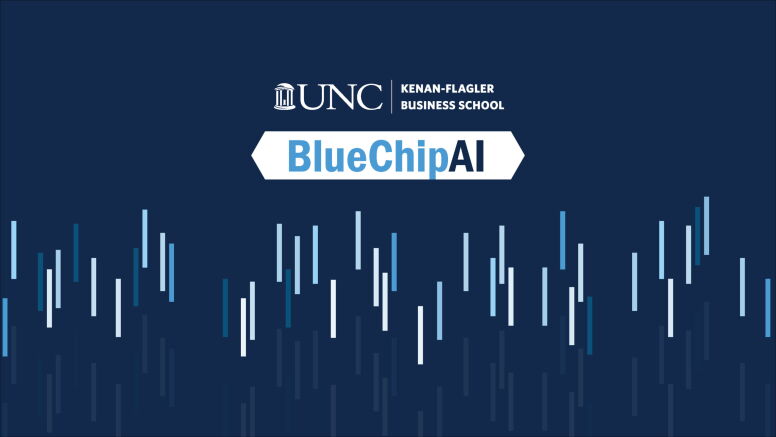News & Stories
BlueChipAI launched to drive AI access at UNC Kenan-Flagler

UNC Kenan-Flagler Business School has launched BlueChipAI, a new generative artificial intelligence (AI) platform designed to advance AI literacy and skills for students, faculty and staff.
Tailored for the Business School’s teaching, research and operational needs, BlueChipAI uses nebulaONE® by Cloudforce. This Microsoft-based gateway makes many AI tools accessible for both novice and advanced users.
“With BlueChipAI, every member of our community — students, faculty and staff — can explore multiple generative-AI tools in a secure environment. They can gain deeper experience learning and making decisions using data we do not want used to train public models,” says Dean Mary Margaret Frank (BSBA ’92, MAC ’92, PhD ’99). “By combining breadth of exposure with safeguards, we are preparing our community to use AI creatively, confidently and ethically as we live our core values of integrity, inclusion, innovation and impact.”
Aligning with Chancellor Lee Roberts’ strategic priority on AI, Frank charged the Business School’s emerging technology committee to evaluate and recommend generative AI platforms based on access, cost-effective pricing, data security and compliance.
With donor support for innovation at UNC Kenan-Flagler, followed by the Provost’s AI Acceleration Program’s commitment to fostering experimentation at Carolina, the Business School is taking a leading role in integrating advanced technologies into the heart of academic experiences.
The collaborative initiative between UNC Kenan-Flagler, UNC Information Technology Services (ITS) and industry partners Microsoft and Cloudforce was essential in designing a robust, secure architecture that meets the Business School’s specific needs and prepares for a potential campus option.
Leading nebulaONE®’s deployment at UNC Kenan-Flagler are Associate Dean of Information Technology Georgia Allen, who is focusing on technology and infrastructure, and Faculty Consulting Group Director Paul Wolff, who is overseeing instructional and educational development. With the platform’s launch, they also organized weekly training sessions to educate the community on generative AI capabilities and the importance of data security, privacy and ethics.
The BlueChipAI platform provides tools called “agents” that can assist with writing, answering questions, brainstorming, summarizing text, translating languages and more using powerful large language models (LLMs). Unlike general-purpose AI, these generative AI agents are tailored to meet goals and needs unique to the Business School within a secure environment.
Users can create “personal” agents in their own BlueChipAI workspaces, tailoring tools to their individual needs. Faculty, for instance, can use their own data and intellectual property in the secure environment, where files are local to their individual chat sessions, aren’t used to train a model and aren’t accessible to other users.
Wolff is developing “official” agents to support teaching, learning and operational efficiencies. He and Allen will continue to work with Cloudforce to develop “custom” agents that can be trained to perform specialized functions and address specific challenges. These advanced agents will help introduce innovative learning experiences, such as classroom simulations where students practice skills like negotiation or delivering a sales pitch.
Early successes include analyzing participant feedback about an executive program; building a hub that answers Undergraduate Business Program students’ frequently asked questions; developing agents to respond to finance and HR questions; and creating a job-interview simulation tool for students.
“BlueChipAI symbolizes the best of Carolina. Innovation across the campus — with collaboration and support from our alumni and the University — is meeting a major need that enhances educational opportunities and career readiness of our graduates.” says Frank. “We are excited about the possibilities for the University as UNC Kenan-Flagler takes these steps to enhance students’ generative AI capabilities and delivers on our plans to deliver dynamic, experiential learning.”